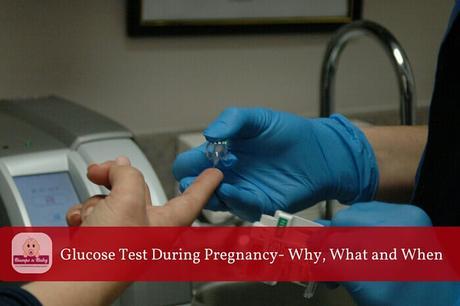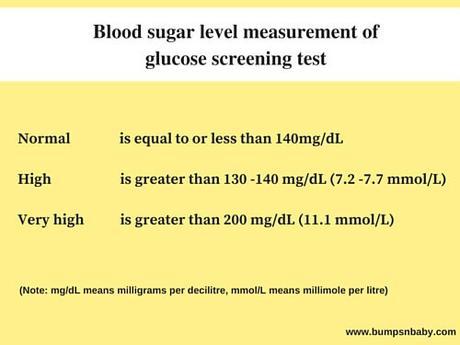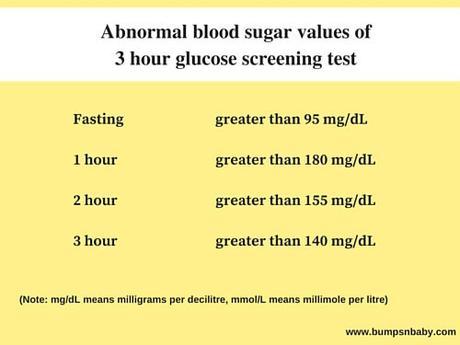Is the glucose test during pregnancy only for those with a history of diabetes?
Are you pregnant and waiting to get your glucose test done?
Is the glucose test during pregnancy phase mandatory?
If anyone asks me what was the one thing that I hated during my pregnancy, my answer would be - the Glucose Test.

I know mommies, even you might feel the same.
But this is a test that should not be ignored at any cost during one's pregnancy. It's very important to avoid any complications in your pregnancy stage. This test, along with the others prescribed by your doctor, will help to ensure that you and your baby stay healthy through the course of your pregnancy.
Before heading into details about this test, we will discuss a few things about insulin function, gestational diabetes mellitus, the risk factors, symptoms, effects on your baby, treatment and a few food suggestions.
Insulin and its function:Insulin is the hormone which facilitates the entry of glucose into the cells of our body thus helping to keep blood glucose level in control.
But do you know the fact that this insulin hormone can be blocked by certain hormones when we are pregnant?
Now you may think "So how can one manage their blood sugar levels during pregnancy"
Want to know?? Read on to clear all your doubts and concerns.
Gestational diabetes or gestational diabetes mellitus (GDM):As I mentioned above, during pregnancy, our body produces some hormones against our own insulin thus making us resistant to insulin.

This hormonal action is necessary as it takes place to give the sufficient glucose from the mom's blood to the growing foetus inside the womb.
But we moms also need sufficient insulin to get our blood sugar levels under control. Our body knows this too. So the good thing is that our body produces extra insulin to balance our blood glucose levels.
But unfortunately, some women may not be able to produce this extra insulin and their blood sugar level rises causing them to have a gestational diabetic condition.
Symptoms of gestational diabetes mellitus (GDM):
You may think that gestational diabetes mellitus may affect you only if have diabetes, but that is not the case. But luckily, our body lets us know if there is any issue.
All you have to do is, watch out for the signs. These are the main symptoms shown by pregnant ladies who suffer from GDM -
- Fatigue
- Blurred vision
- Increase in thirst
- Increase in urination
Gestational diabetes mellitus occurs in approximately 4% of pregnancies.
So how do you know if you are at risk?
The chances of one getting gestational diabetes mellitus increases with any one of the following factors-
- If you have family history of diabetes or have previous history of diabetes.
- If you are above 27 years of age
- If your BMI falls in the obese category
- If you have delivered an overweight baby/still baby in your previous pregnancy
If you do not seek timely treatment for gestational diabetes mellitus, your pregnancy will be far from uneventful.
If GDM is left untreated, it will affect you as well as your baby and it can lead to the following complications-
- Increased chance of caesarean section
- Risk of injury to both mom and baby is high during normal delivery in case your baby is overweight
- Pre-eclampsia: a condition where pregnant women are diagnosed with high blood pressure, usually after their 29-week. They also show symptoms of increased level of protein in their urine and swelling on hands, feet and legs.
- Your baby will be overweight
- The chances of still-birth increases
- Baby will show neonatal hypoglycaemia (low blood sugar) during the initial days
- Baby will suffer from breathing problems during the initial days
The main aim of treating pregnant women suffering from gestational diabetes is to achieve normal glucose levels. This will help them to deliver a healthy baby without any complications. Fortunately, once diagnosed, GDM can be treated. Let us look at the treatment methods that are used to treat GDM.
Treatment methods:Eat healthy foods, avoid junk foods, store bought juices, soft drinks. Take a balanced diet including carbohydrates, protein and moderate intake of fat. Check with your gynaecologist or dietician for specific dietary recommendations.
Regular and moderate exercise help in good insulin function. Again, check with your doctor before you start exercises, to know if they suit you.
- Monitoring the blood glucose level
Once diagnosed with gestational diabetes, one can check their own glucose level at home after getting proper advice and confirmation from their doctor.
When your doctor recommends to do it by yourself, checking glucose in blood is simple. You just have to prick your finger, put a drop of your blood on the blood glucose meter (machine) and check the readings.
It is a simple foetal monitoring test performed after 28 weeks' of gestation. As the name implies, no stress is applied on the foetus during this test. It is mainly done to hear baby's heartbeat by placing a small machine on mom's abdomen.
Heartbeat patterns are displayed on a machine which helps the doctors to check whether the baby is doing fine or not.
If following a healthy diet is not controlling the blood sugar, then your doctor may prescribe oral medicines or insulin therapy. But majority of them will be fine by following healthy diet and there may be no need of medicines.
If a pregnant woman is diagnosed with gestational diabetes, this will go away by itself after delivery. But there chances of developing type 2 diabetes later in their life. So get routine check-ups post-delivery.
What can I eat? - recommended foods for gestational diabetes:It's very important to watch how much you eat (portion size) and the quality of food. Reduce your portion size from your normal eating habits and increase the frequency of eating.
Following are a few suggestions that you can observe. But always check with your nutritionist or dietitian for dietary recommendations.
- Eat less, but more frequently
- Consume lesser carbohydrates, but do ensure that what you have come from a good source of carbohydrates such as whole grain cereal/wholegrain bread or porridges
- Eat pulses as they are rich in protein
- Take moderate amounts of dairy products for calcium
- Include green leafy vegetables for iron source
- Include more vegetables and fruits
- Include more fish in your diet but exclude fishes which have high mercury content (eg: tuna, shark, swordfish etc)
- Avoid packet foods which is labelled unsuitable for diabetic patients
- Avoid raw/uncooked eggs and unpasteurized milk
- Reduce sugar and salt intake
- Reduce fat intake
If you are planning to start a family but are worried about gestational diabetes, you can avoid it from occurring to you. All you have to do is watch your lifestyle. Yes, it is as easy as that.
If you are overweight, try to reduce your weight to the normal range before planning to conceive. Also eat healthy and follow good food habits. Exercising regularly will also help you stay healthy and reduce complications once you conceive.
Glucose test during pregnancy or glucose tolerance test (GTT) :
It's also known as Oral Glucose Tolerance Test (OGTT) or Glucose Challenge Test.
GTT is a test used to check how well a pregnant women's body is processing the sugar thus checking whether she is having gestational diabetes or not.
Gestational diabetes usually starts in mid-pregnancy. So all the pregnant ladies will be asked for an OGTT between 24 and 28 week of pregnancy. But some of them are asked to get this test done earlier. The cases where expecting moms are asked to do this test earlier than 24 weeks are-
- Have a history of GDM in their previous pregnancy
- Are over weight
- Show excess sugar in urine
- Family history of diabetes
I know, you know and we all know it's such an uncomfortable test to have in our mid pregnancy stage.
I still remember my GTT days. The word "pricking" itself made me want to pass out!!!
My birth centre was a bit far away from my home. So I preferred to do this test in a laboratory clinic which is very near my home.
My elder sister took me to the hospital for this test during my 25th week.
The early morning time, getting dressed up, drinking the glucose solution on an empty stomach, long boring waiting hours on an empty stomach, the pricking and drawing of blood.....
OMG, if I had stumbled across a kid eating biscuits at that time, I would have definitely snatched it from them!
I was praying to fast forward the time rather than getting a good test result.
As soon as my test has finished, I landed up at a restaurant and filled my growling hungry stomach with masala dosas and vada 😛
How the test is done?First a glucose screening test is performed. For this, there is no need of fasting. You will be asked to drink a glucose solution. After 1 hr, your blood will be taken to check the blood glucose levels.
If your blood glucose is found to be between 140 and 200 (sugar not processed well), then you will be asked to come for a 3 hr glucose tolerance test on some other day.
You will be given a glucose solution (100 gm of glucose) on an empty stomach.
Your blood will be drawn and checked before drinking the solution, then it will be done every 30 to 60 minutes (1, 2 and 3 hrs) after you drink it.
Most women do not have any side effects when they undertake the glucose tolerance test. But some moms to be complain of nausea or of feeling light-headed because of the glucose solution. Some even start to sweat.
If you end up vomiting, then you will have to re do the test, so carry a lemon and think happy thoughts.
If any one of the results of the oral glucose tolerance test is higher than the normal values, you will be just asked to modify your diet. Then the test will be repeated a few days later once you have changed your food habits.
A value between 140 and 200 mg/dL in 2 hr time is called impaired glucose tolerance or pre-diabetes
If you have an acceptable blood glucose level, then you can relax. But if more than one of the blood glucose results is higher than the normal values, you will be diagnosed with gestational diabetes.
How to prepare yourself before taking 3 hr GTT?The 3 hour glucose test preparation is actually quite easy. But you need to adhere to it for accurate test results.
- You should continue with your normal diet before the test day.
- You should not eat or drink anything other than water 8 - 14 hours before your test. This test is usually done in the morning hours.
- You should not eat during the test also.
- If you are suffering from any illness or are on any medication, do inform your doctor as this may affect your test results.
- You should avoid going to toilet just before starting from home as you will be asked for a urine sample in the clinic.
- Keep some books or magazines to kill the time while you wait.
You can also refer to the 16 frequently asked questions on gestational diabetes.
ConclusionSo let me conclude by saying that the glucose tolerance test is very important for all pregnant ladies to check how their body is processing blood glucose and thus preventing any complications in your pregnancy.
I do agree that we feel uncomfortable during the test. Don't make these excuses and reasons to avoid this test. And one more thing don't ever end up self-testing yourself.
If you are diagnosed with Gestational Diabetes Mellitus, don't panic and don't let the tension get to you which will affect your baby. Gestational diabetes can be treated successfully with good food habits and exercise and if needed with medicines. This abnormal condition will go back to normal soon after delivery in most cases.
Most importantly always stick to healthy eating habits throughout your life.
I hope I have answered any questions and doubts that you have about glucose test during pregnancy. Do let me know if you have any more queries or comments.

posted on 21 June at 12:32
This video shows the natural treatment that can reverse your diabetes in a one week!
http://tinyurl.com/jzuw8bd
Before i watched this... My Type 2 Diabetes almost killed me. 3 years ago, I fell into a diabetic coma. When I woke up, the doctor told me had to amputate my legs. It comes from research from Newcastle University in England… …and so far, over 39,264 people have used it to manage their diabetes.
Have A Good Time.. Thx.. ^_^ _
sx12sadasasasadasa